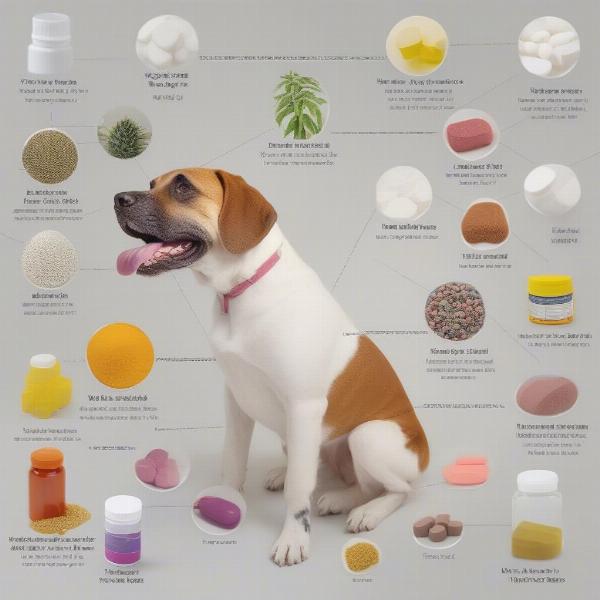Liver supplements for dogs are becoming increasingly popular amongst pet owners looking to support their furry friend’s overall health. But are they necessary, and how do you choose the right one? This guide will delve into the world of liver supplements, covering their benefits, risks, and everything you need to know to make informed decisions for your canine companion.
Understanding the Canine Liver
The liver plays a vital role in a dog’s body, responsible for filtering toxins, producing bile for digestion, and metabolizing nutrients. A healthy liver is crucial for a dog’s overall well-being. However, various factors, including age, diet, and underlying health conditions, can compromise liver function. This is where liver supplements can potentially offer support.
When Might a Dog Need a Liver Supplement?
While a balanced diet is the cornerstone of good liver health, certain situations may warrant the use of a liver supplement. These include dogs with existing liver conditions, senior dogs, dogs recovering from illness, and dogs exposed to toxins. Always consult your veterinarian before starting your dog on any new supplement, including liver supplements, to ensure it’s appropriate for your dog’s individual needs.
Types of Liver Supplements for Dogs
There are various types of liver supplements available, each with its unique composition and benefits. Some common ingredients include:
- Milk Thistle: Known for its antioxidant properties, milk thistle may help protect liver cells from damage.
- SAMe (S-Adenosylmethionine): This naturally occurring compound supports liver detoxification and regeneration.
- B Vitamins: Essential for various metabolic processes, B vitamins can aid in liver function.
- Antioxidants: These help protect liver cells from oxidative stress.
 Different types of liver supplements for dogs available on the market
Different types of liver supplements for dogs available on the market
Choosing the Right Liver Supplement
Selecting the right liver supplement can be overwhelming given the numerous options available. Consider the following factors:
- Your Dog’s Specific Needs: Consult your vet to determine the most appropriate type of supplement based on your dog’s health status and age.
- Quality of Ingredients: Look for supplements made with high-quality, natural ingredients and avoid those with artificial fillers or additives.
- Dosage and Administration: Follow the manufacturer’s instructions carefully and consult your veterinarian for guidance on the correct dosage for your dog.
- omega 3 and 6 dogs These essential fatty acids contribute to overall health, including liver health. They can also be found in certain liver supplements or added as a stand-alone supplement to a dog’s diet.
Potential Side Effects and Precautions
While liver supplements are generally considered safe, some dogs may experience mild side effects such as digestive upset. It’s important to start with a low dose and gradually increase it as directed by your veterinarian. Always monitor your dog for any adverse reactions.
Are Liver Supplements a Substitute for a Healthy Diet?
Liver supplements are not meant to replace a balanced diet. A nutritious diet rich in high-quality protein, healthy fats, and complex carbohydrates is crucial for maintaining optimal liver health. cod liver oil capsules for dogs can also provide some benefits, but should be used with caution and under veterinary supervision.
Monitoring Your Dog’s Liver Health
Regular veterinary check-ups are essential for monitoring your dog’s overall health, including liver function. Blood tests can assess liver enzyme levels and provide valuable insights into liver health.
Conclusion
Liver supplements can be a beneficial addition to your dog’s health regimen, particularly for dogs with compromised liver function. However, it’s crucial to consult with your veterinarian before starting your dog on any new supplement to ensure its safety and efficacy. A balanced diet, regular exercise, and routine veterinary care are the cornerstones of a healthy and happy dog. Remember to choose high-quality supplements and monitor your dog closely for any adverse reactions.
FAQ
-
What are signs of liver problems in dogs? Some signs include jaundice, lethargy, vomiting, loss of appetite, and increased thirst.
-
Can I give my dog human liver supplements? No, never give your dog human liver supplements as they may contain ingredients that are toxic to dogs.
-
How long does it take for liver supplements to work? The effects of liver supplements can vary depending on the individual dog and the underlying condition. It may take several weeks or even months to see noticeable improvements.
-
Are liver supplements expensive? The cost of liver supplements varies depending on the brand, ingredients, and formulation.
-
xanax dose dog? While Xanax is sometimes prescribed for dogs with anxiety, it is not a liver supplement. Discuss any concerns about your dog’s anxiety with your vet.
-
brands of peanut butter safe for dogs Peanut butter is not directly related to liver health, but it can be a healthy treat in moderation. Make sure it does not contain xylitol, which is toxic to dogs.
-
probiotic spray for dogs Probiotics are beneficial for gut health and can indirectly support liver health. Consult your vet for advice on using probiotics for your dog.
About ILM Dog
ILM Dog is your trusted source for expert advice on all aspects of dog care, from breed selection and nutrition to health, training, and grooming. We provide practical, evidence-based information to help dog owners worldwide provide the best possible care for their furry companions. For inquiries or expert advice, please contact us at [email protected] or +44 20-3965-8624.